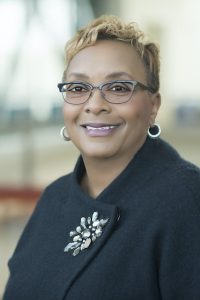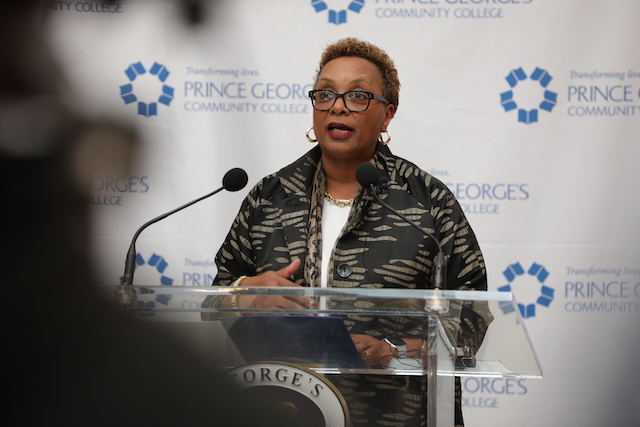Dr. Charlene Dukes: a maverick, advocate, and leader to retire
“We are a people that made a way out of no way,” said Dr. Charlene Dukes, the President of Prince George’s Community College.
As the first African American woman President at PGCC, I asked her if she ever thought she’d be a college president when a little girl. Dr. Dukes said, “Absolutely not.” Retiring soon after 13 years leading the college, she knew when little that, “College was in our future because our parents always talked about that.”
Racial Barriers and Educational Disparity
Her parents talked about education with their children in terms of what the parents were unable to achieve for a couple of reasons. Her mother, from North Carolina and her father from South Carolina, were part of the great migration. African Americans moved north to avoid hatred and racism and, as Dukes explains, to get work at the steel mills that stretched along the water known later as the rust belt. The second reason was that, in her community of color, expectations were not focused on college. Dukes’ father was told by his counselor that he should be a carpenter, not an architect. They settled in Johnstown, Pennsylvania.
Her parents expected Dukes and her older brother to set the example for education. She said they believed, “College has the opportunity to create opportunities that were not available to them.” Dukes wanted to be an English teacher, and, after doing well in school, she was accepted at Indiana University of Pennsylvania (IUP). She recalled speaking to her advisor. She was excited to review the English classes but noticed a problem. She wanted to teach grammar and asked her advisor where the grammar classes were. He told her that there were no such classes. Students learned about grammar before going to college.

Dukes enrolled as a freshman at IUP in 1972. She recalls attending her first class; there were three other African Americans. The professor said to them that he did not think that African Americans had what it took to be successful at college, that Affirmative Action should not be how one gets to college. He told them to not even bother attending. One would get an A. The other a C, and one an F. He said, “You don’t belong here.”
Dukes could not believe what she was hearing. “At 17 or 18, we didn’t even know how to take that.” She recalls saying to him, “Did you see my SAT scores? I scored around a 1,200.” All three attended and worked very hard in class. In the end, Dukes said all three passed. “I believe I got a B.”
Education Interrupted
Dukes left college after one year and moved to New Jersey/New York. She got hired by Bell Telephone and later at Chase Manhattan Bank. She recalled a conversation with her supervisor when she asked for a promotion. The supervisor told her that if Dukes wanted to move upward, she’d have to get a college degree. The supervisor said he hired her because she had some education.
Shortly after, Dukes reenrolled at IUP in 1976-77 and finished her English degree. This time she worked full-time and went to school full-time, a real triumph considering the time period.
Dukes’ dream of being a school English teacher seemed thwarted, however. She said that she was interviewed 10 or 12 times. “They did not expect to see that,” meaning that those doing the hiring up and down the Johnstown-to-Pittsburgh corridor did not expect to see such a good transcript come from and African American woman. Every time she went for an interview, “It was like the air got sucked out of the room.” Dukes was not offered a single job.
Feeling discouraged, a friend told her to apply to the University of Pittsburgh at Johnstown. They were looking for an admissions officer that had good oral and communication skills. Dukes finally got a position. “The rest was history.”
Yet Dukes’ experience at IUP, where she was one of one hundred African American students out of about 10,000, made her “An advocate for social justice.” She became a maverick and remembers people telling her that she, “Had a chip on her shoulder,” and she answered, “I have a right to have a chip on my shoulder. If we can live through this, we can live through anything.”
Good Environments Equal Student Success
“It’s the environment that helps people graduate,” and IUP is still struggling with race-related problems, so much so that Dukes’ recently called the President of IUP. When Dukes was a student and the President of the Black Student Union, she got called to the President’s office a lot: “When you think others are less than you, then treat them as less than you.”
Dukes has advice for minority students. “Don’t let others define you,” especially in negative ways, because sometimes it is just easier to meet others’ negative expectations than to try and work against it, especially in an environment where a person is 100/10,000.
Dukes believes that education is the major social justice issue for students of color at Prince George’s Community College and everywhere. “I think our students understand that.” Dukes advises that what students need is someone who will support their education and their dreams, and, when we do, then students succeed. It’s not about being difficult on a student; rather, she says, “It’s believing that a student can do the work.” It’s respect.
Educational Leadership Involves Learning from Other Leaders
Dukes credits her ability to lead the institution through several political changes to her past mentors. She still speaks with former Dean Helena Hughes, now 93, and says she learned from her to use relationships to exact change. She learned from Dr. Robert Bickford to be firm but listen to people. Dr. Ronald Williams, the previous president, taught her how to change communities through the educational work people do at PGCC.
Such experience helped Dukes lead community involvement initiatives through partnerships with organizations and businesses in the community, a better understanding of how local government works, and the state and federal laws that mandate PGCC operations and procedures. In helping the College run smoothly, it’s a matter of putting all of these together.
Dukes says that sometimes the College has little choice on some decisions, but she can help to answer the question why and direct the College to move forward with its objective in closing the gap on educational disparities. She encourages all PGCC employees to show up at their best every day.
Dukes also credits her leadership and navigation of PGCC in having 8 siblings. She reflected that water had to be heated on the stove for baths. All kids needed to bathe with only three water changes.
Such started her path as a savvy leader. Yet, she never felt poor. The family had a set of values, and the house was filled with love and fun as well. She recalls that the first time she felt a difference was when she noticed her lunch ticket at school was red, a different color than the other tickets. Difference was color-coded.
A Great Economy has Great Educational Opportunities
“We can’t talk about a great economy if we cannot talk about education and what that does to support that. We cannot talk about a talented workforce if we cannot talk about how education supports that.”
Upon retirement, Dr. Dukes does plan to “Never work full-time again,” but her passion for social justice will continue. As President, she is not always so free to be open about her opinions, but soon she can focus on all of those in the community that are voiceless and help them to be heard.
When asked, she may consider a book. After all, she started her profession wanting to be an English teacher (and actually taught some English courses part-time at PGCC). Now her son is writing for shows in Los Angeles. It seems writing is in the family.
It was also an English professor, the late Dr. Ann King, that stopped Dukes over 13 years ago and said, “You know, Charlene, you can do this job.” Dukes decided to apply.
One door opened many others.
The opinions and analyses that Earl writes are his own and are not necessarily the positions or views of his employers, the agencies he supports, or that of his colleagues. Reach out with comments or questions.

